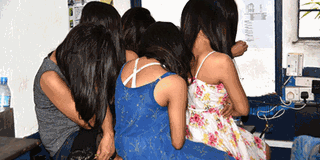Covid-19 exposing girls, women to sex predators

Nepalese women arrested during a raid at Nyali Police Station in Mombasa, last year. They were allegedly part of an international human trafficking syndicate. Young girls are now more likely to fall into this trap. PHOTO | FILE | NATION MEDIA GROUP
A few days after April 8, a man in Mtwapa, Kilifi County offered a woman in Mombasa an unspecified job.
He wanted her to travel, notwithstanding President Uhuru Kenyatta’s ban on travel in and out of Mombasa and Kilifi counties for an initial 21 days beginning April 8. A measure the President took to control spread of Covid-19.
For the recruiter, travel ban was not an impediment. He advised her to use Shanzu, a small town north of Mombasa, about 5.8 kilometres away from Mtwapa, as an exit route.
She, however, did not want to risk arrest and being quarantined for 14 days on her bill. It is a cost she would not afford.
ESCAPE POVERTY
On the other hand, she desperately needed a job to escape from poverty. She sought the intervention of a community elder who also monitors trafficking of girls and women in Mombasa County. She asked the elder to speak with the recruiter and convince him to keep the opportunity open till the government lifts the travel ban.
But the phone went mute the moment he had elder greet him. The recruiter switched off the phone, never to contact the woman again.
It then became clear the woman was being set up for sex trafficking.
This is one of the six cases of human trafficking that Trace Kenya, an organisation fighting human trafficking and modern day slavery has handled between March 16 and May 4.
Mr Paul Adhoch, Trace Kenya Executive Director says two Kenyan women who had been trafficked for sex are stranded in South and Western Asia. One in India and another in Iran.
They were trafficked before suspension of international passenger flights on March 25, with promises of domestic jobs only to realise, on arrival, they had been brought in for non-consensual sex work.
COVID-19
The three other cases reported are from Mombasa and one in Voi.
“A girl from lower Eastern was promised a job in Voi. She arrives and realises there was no job; someone just wanted to take advantage of her,” says Mr Adhoch.
He says perpetrators are taking advantage of the Covid-19 pandemic to prey on the vulnerable girls and women.
His organisation is working with community elders to monitor illegal movement of poor girls and women in the coastal region to rescue them before harm.
But monitoring physical movements is not enough to stop sex trafficking as perpetrators also lure minors through virtual platforms.
In March 2020, Europol, a European Union Agency for Law Enforcement Cooperation reported an increase in online activity by those seeking child sexual abuse material.
The abusers place postings in dedicated forums and boards soliciting opportunities to engage with children. Their target for children is grounded on assumption that they spend more time online since they are not in school due to the pandemic. And that their parents are supervising them less or they are isolated, free from their guardians’ eyes.
United Nations Children’s Fund (Unicef) warns that more than 1.5 billion children and young people globally affected by school closures are at increased risk of harm online.
The UN agency notes that children and young people are vulnerable to online sexual exploitation and grooming as they spend more time on virtual platforms where abusers are preying on their victims.
ACCESS JUSTICE
“Parents focus is on working from home thinking their child is safe somewhere in the home. This lack of oversight creates an unprecedented opportunity for an increase in grooming and online enticement,” says Tsitsi Matekaire, Global Lead for End Sex Trafficking at Equality Now.
She adds: “Governments need to develop rapid assessment tools to document in real time people’s experiences and ensure essential services for victims are available and that they have access to justice.”
Ms Judy Gitau, Equality Now’s regional coordinator projects a rise in victims of sex trafficking should key stakeholders in anti-trafficking chain fail to urgently effect preventive measures.
She says Covid-19 has pushed households into extreme poverty and financial crisis, a predicament drawing them closer to the claws of sex predators
“Those who were vulnerable before will only be more so now and become further trapped in exploitation,” she notes.





